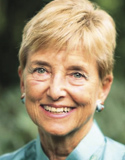BY SANDRA JACOBS, VITAL SIGNS EDITOR

Dr. Carole E. Allen
Carole E. Allen, MD, MBA, FAAP, a board-certified pediatrician who practiced in Massachusetts for 37 years, became the 139th president of the Massachusetts Medical Society (MMS) in May.
Since retiring from practice in 2011, Dr. Allen has devoted herself to policy making, advocacy for health care access and quality, and leadership — including serving six years on the Board of Directors of the American Academy of Pediatrics (AAP) and five
years on the Massachusetts Health Policy Commission; earning an MBA; and chairing or serving on eight MMS task forces and committees.
Throughout her career, Dr. Allen has advocated for the health, protection, and well-being of children, including award-winning work on preventing tobacco use and exposure. In 2004, she chaired the Tobacco Free Mass coalition that helped to pass the Massachusetts
Smoke-Free Workplaces law.
Her advocacy began with the AAP and close to home in Arlington, MA, where she lived with her family and ran her own practice from 1989 to 2002. She subsequently became specialty director for pediatrics at Harvard Vanguard Medical Associates, overseeing
14 practices with more than 60 pediatricians. Earlier, she worked for 14 years as a staff pediatrician at the East Boston Neighborhood Health Center. She recently spoke with Vital Signs about her work, the issues that
motivate her, and the importance of physician advocacy.
VS: Why did you first get involved with the MMS?
Dr. Allen: I joined after I started a private practice in the early 1990s because the Medical Society offered services that would be helpful, such as talking to insurers, how to work through an Independent Physician Association,
and other practice management issues. I’d already engaged in advocacy through the AAP, and I soon became the pediatrics delegate to the MMS House of Delegates (HOD. Then I was asked to be a delegate for Middlesex district.
Although I joined the Medical Society for one purpose, I quickly became immersed in the work of the HOD and passing policy and using that avenue for advocacy around patient care and issues that I cared about.
VS: How did you become a self-described “vocal public health advocate,” or what others have called a “social justice warrior”?
Dr. Allen: The common expression is that “all politics is local.” But politics is also personal. When I started having a family, I became more aware of what was happening in our town. When my son was home sick one day, I went
into Arlington High School to pick up his books. And it smelled like an ashtray! The smell of cigarettes was coming from the teachers’ break room. From that day, as a parent and a pediatrician, I became interested in public smoking policies.
This eventually led to joining and then chairing the Arlington Board of Health. That was the beginning of my local advocacy.
VS: You are known for strong relationships with state legislators.
How did this develop?
Dr. Allen: As a passionate advocate, I’ve worked with many legislators. Over time I got to know them. I understand they are real people, and that we have common goals. We respect each other. When I interact with them, it’s
either around patient-centered initiatives or issues in the interest of public health.
VS: Why is it important for physicians to understand and engage
with policy?
Dr. Allen: You can work one-on-one with the patient and accomplish something good for that individual. But if you want to help a population to be better off, systems issues are at work. The need is for systems or policies
to be fixed and improved. Physicians are starting to see those connections more than they used to, especially younger physicians and students. This may be due to our current focus on institutional racism and the very visible disparities in
health and health care during COVID-19. Younger physicians seem to be committed to making sure that policies work in favor of their patients.
VS: Over your career, and particularly since COVID-19, have you seen a shift in the role taken on by organized medicine?
Dr. Allen: There was a time when physician organizations focused primarily on the needs of physicians in their practice of medicine, and the patient was also seen as the beneficiary in turn. Now the MMS and other organizations
are also focusing on racism and social determinants of health. We are trying to figure out more about the needs of patients and how we can get there. We’re not there yet, but we are making headway. It takes leaders like my predecessors Drs.
Dave Rosman and Maryanne Bombaugh, who kept the drumbeat going to help us get where we are now.
We are moving in the right direction. It is exciting to be part of that movement and to be able to help advance it. I am fortunate to be a president of a medical society now to keep these changes going.
VS: What energizes you to keep up this work?
Dr. Allen: Outside of work, what fills my well is my family: my husband, my kids, and my grandkids. I also like to garden. I am a lifetime member of the American Rhododendron Society.
In health care, what drives me is that I constantly look at and think about systems — always wanting to improve them, to make them work better.
